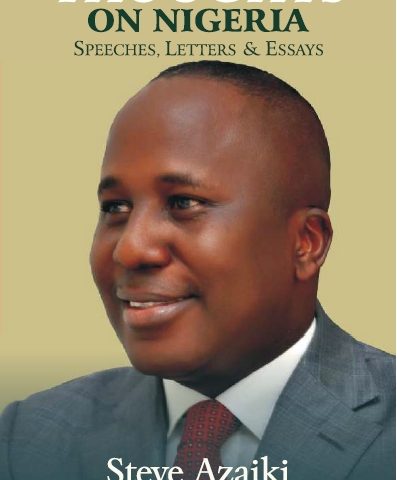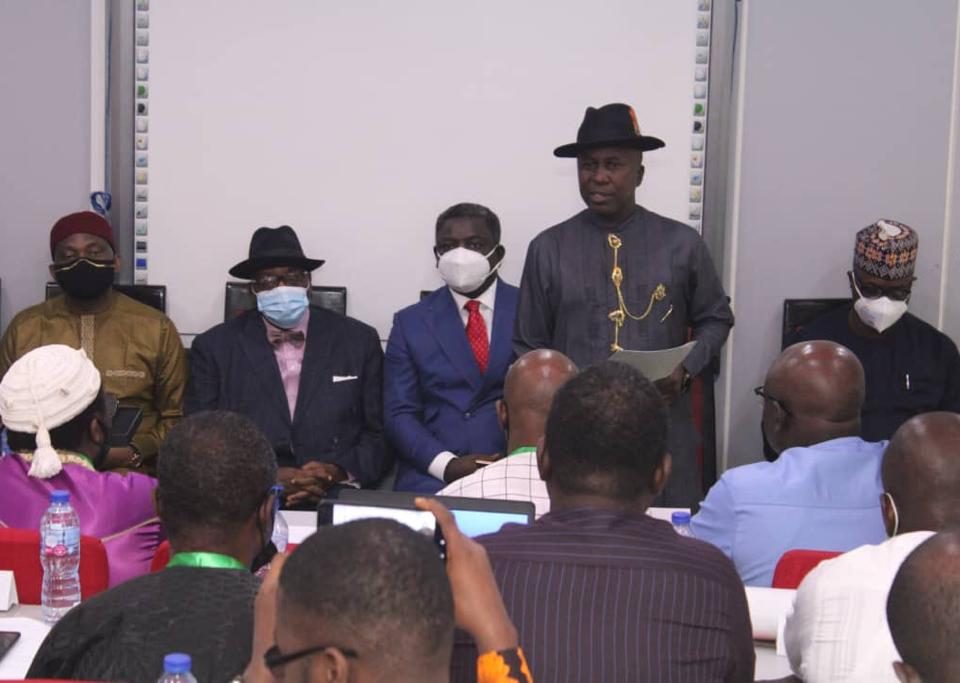
Azaiki’s Thoughts on Nigeria by Solomon Elusoji
July 15, 2015
There must be transparency and accountability in N’Delta amnesty programme – Interview
August 8, 2015by Precious Dikewoha
Thoughts on Nigeria is the latest offering from Prof Steve Azaiki, ex-Bayelsa State Secretary to the State Government (SSG). It is a five-part book. The first part deals with governance and politics; the second centres around the Niger Delta; the third is made up of tributes to great Nigerians; the fourth are views on international and contemporary matters; and the last part is made up of interviews on issues largely around the Southsouth, resource control and so on.
The book, which is a collection of Azaiki’s published articles, essays and interviews, contains his emotional piece on the passing of his sister, Cecilia Zifawei. As expected of such piece, it drips with emotion. It shows the moment must have been one of the most painful in his life. The emotion displayed in the piece confirms the fact that the deceased was like a mother to Azaiki.
His “My Three hours with Goodluck Jonathan” is a detailed account of his meeting with the former President at the Presidential Villa and issues related to the meeting. Some of the issues that came up during the meeting include Almajiri education, second Niger bridge, power challenge and so on.
Another article, which will remain relevant for a long time to come, is “Confronting Poverty and Social Insecurity in the Niger Delta”. It espouses the issues in the Niger Delta and how corruption has not made impossible to tackle the challenges facing the region.
Azaiki’s intellectual prowess comes into play in “Why the Hostage-Taking Industry must collapse”. It is an x-ray of the hostage-taking, which started in the Niger Delta but has spread to other parts of the country and seems to have defied all efforts to curb it.
Two pieces, which those leading the fight against insurgency, are bound to gain from are “Nigeria at War: The case for State of Emergency” and “State of Emergency against Boko Haram”. They are both about the Boko Haram menace. Written before the kidnapping of the Chibok girls, the pieces paint the gory picture of the insurgency challenge and suggested ways to deal with it.
Azaiki’s concern in “Political Conference of Hope” is on the vexed issue of how to arrive at a working configuration to move Nigeria forward.
Aside his tribute to his sister, Azaiki’s offering on former President Shehu Shagari is worth delving into. Titled “Alhaji Shehu Shagari: The Moral Leader of Our Nation”, it is a fitting tribute to Nigeria’ first Executive President. It is an expression of the high esteem in which he holds the respected statesman. So many writers have examined the Da Vinci Code from different perspectives. It is no surprise that such spiritually-stimulating subject is bound to attract such responses. Azaiki tried to review some of the these diverse views in “The Vinci Code: Was Jesus married?”
His desire to help solve the myriad challenges facing the country led him to the formation of the National Think Tank. So, the piece “Call to Service: The National Think Tank – Mission Statement” points out why the body was formed. It shows that strategic planning, being very critical to success of any nation, was the main reason for the organization, which provides a platform to assist government in the formation of its policies.
His piece “Let Mandela Go” reviewed the rare honour and privilege of meeting Madiba in 2007 when former President Thabo Mbeki introduced him to the world icon. The new about the late Madiba’s health provided him the opportunity for the review. In the piece, he leaves no one in doubt that he saw Madela as great and fulfilled man, who fought the good and had nothing to lose departing in peace.
Also touched in this book are issues quite germane and connected to the Niger Delta, oil theft, kidnapping, constitutional conference, Bok Haram, leadership, politics, agriculture, patriotism and many others that have impacted positively on the people and country.
Azaiki shows that he is a highly detribalised Nigerian who has continually called many’s silence in time of danger into question.
In this book, he has given so much to the country expecting nothing in return. This book indeed is a document of history.


